Moffatt New Testament Commentary Series (16 vols.)
Digital Logos Edition
Overview
James Moffatt’s New Testament Commentaries provide significant scholarship on a valuable Bible translation. This classic series was edited by Moffat himself and is based on his translation of the New Testament. With volumes from C.H. Dodd, Theodore Robinson, and George S. Duncan, these works are rich in biblical exegesis and analysis offering exposition in a format that’s rigorous and scholarly, yet clear and readable.
Educated at Glasgow University, then a professor of Greek and New Testament at Oxford, James Moffatt went on to teach church history at the United Free Church College, where he worked on his greatest ambition—providing an easily readable Bible. He eventually produced the Moffatt New Translation (MNT), which he designed to be highly accessible, written in “effective, intelligible English . . . a fresh translation of the original, not a revision of any English version,” as he writes in the preface to the 1926 edition. It’s undoubtedly helpful to study the commentaries alongside Moffatt’s Bible translation, but not necessary.
The Logos Bible Software edition of the Moffatt New Testament Commentary Series is designed to encourage and stimulate your study. Scripture citations link to original-language texts and English translations, while important concepts link to dictionaries, encyclopedias, and a wealth of other resources in your digital library. You can perform powerful searches with the Topic Guide to instantly gather relevant biblical texts and resources. And free tablet and mobile apps let you take the discussion with you. With Logos Bible Software, the most efficient and comprehensive research tools are in one place, so you get the most out of your study.
Reviews
2 ratings
Key Features
- Provides clear exposition of the New Testament
- Contains 16 volumes edited by James Moffatt and based on his Bible translation
- Offers accessible commentary by a variety of scholars
Product Details
- Title: Moffatt New Testament Commentary Series
- Editor: James Moffatt
- Series: Moffatt New Testament Commentary
- Volumes: 16
- Pages: 4,114
Individual Titles
- The Gospel of Matthew by Theodore H. Robinson
- The Gospel of Mark by B. Harvie Branscomb
- The Gospel of Luke by William Manson
- The Gospel of John by G.H.C. MacGregor
- The Acts of the Apostles by F.J. Foakes-Jackson
- The Epistle of Paul to the Romans by C.H. Dodd
- Second Corinthians by R.H. Strachan
- Colossians, Philemon, and Ephesians by E.F. Scott
- Galatians by George S. Duncan
- The Epistle of Paul to the Philippians by J.H. Michael
- The Epistle of Paul to the Thessalonians by William Neil
- Epistle to the Hebrews by Theodore H. Robinson
- The General Epistles: James, Peter, and Judas by James Moffatt
- The Pastoral Epistles by E.F. Scott
- The Johannine Epistles by C.H. Dodd
- The Revelation of St. John by Martin Kiddle
This title is included in the following collections
You can save when you purchase this product as part of a collection.
2025 Preacher Diamond Library
$2,999.99$2,999.99Complete Classic Commentary Co...
$17,553.16$3,699.99Logos 8 Lutheran Portfolio Leg...
$4,749.99$4,749.99Logos 7 Lutheran Portfolio Leg...
$4,749.99$4,749.99
- $4,749.99
- $12,102.39$7,299.99
- $21,749.99
- $23,999.99
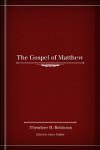
The Gospel of Matthew
- Author: Theodore H. Robinson
- Editor: James Moffatt
- Series: Moffatt New Testament Commentary
- Publisher: Hodder and Stoughton
- Publication Date: 1928
- Pages: 237
This volume contains Theodore H. Robinson’s “everyman’s” commentary on Matthew. While based on the original Greek of the Gospel of Matthew, Robinson offers a running comment on the text in clear, and straight-forward English.
Theodore H. Robinson (1881–1964) was a professor of Hebrew and Syriac. He was dean of theology at the University of Wales. He is best known for his work in Old Testament studies, and was president of the Society for the Study of the Old Testament.
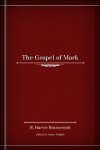
In the Mark volume of the Moffatt New Testament Commentary, B. Harvie Branscomb, seeks “to bring out the religious meaning and message” of the Gospel of Mark. Branscomb provides helpful exposition, designed to be understood by the common man. Dividing his text into sections by event, such as “Minsitry in Galilee,” he offers running commentary, helping readers grow in their comprehension and application of the teachings found in Mark.
Bennett Harvie Branscomb (1894–1998) was the fourth chancellor of Vanderbilt University. He was Rhodes Scholar in Bible studies at Oxford and earned a PhD from Union Theological Seminary and Columbia University.
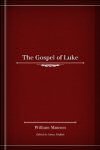
In this volume, William Manson offers exposition and analysis of Luke’s Gospel, conducted in an accessible fashion. Covering the entirety of Luke in the bulk of his commentary, Manson also includes a helpful introduction discussing the general character of Luke’s narrative, the sources of the Gospel, and biographical information about Luke.
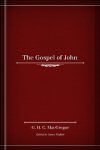
The Gospel of John
- Author: G.H.C. MacGregor
- Editor: James Moffatt
- Series: Moffatt New Testament Commentary
- Publisher: Doubleday, Doran & Co.
- Publication Date: 1929
- Pages: 378
G.H.C. Macgregor provides a helpful commentary on the Gospel of John in this volume. Designed to help the average reader understand what he/she is reading in this New Testament book, Macgregor offers clear analysis and discussion on the entirety of John’s Gospel.
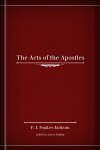
The Acts of the Apostles
- Author: F.J. Foakes-Jackson
- Editor: James Moffatt
- Series: Moffatt New Testament Commentary
- Publisher: Harper & Brothers
- Publication Date: 1931
- Pages: 236
In this commentary on the book of Acts, F.J. Foakes-Jackson gives clear exposition of difficult passages, discusses contextual issues, and provides an accessible and comprehensive guide to the Acts of the Apostles.
F.J. Foakes-Jackson (1855–1941) was a church historian. He taught at Jesus College, Cambridge, and was dean from 1895–1916. He then became Briggs Professor of Christian Institutions at Union Theological Seminary. He is best known for his monumental translation, commentary and study of Acts: The Beginnings of Christianity.
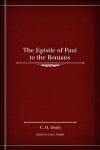
The Epistle of Paul to the Romans
- Author: C.H. Dodd
- Editor: James Moffatt
- Series: Moffatt New Testament Commentary
- Publisher: Hodder & Stroughton
- Publication Date: 1932
- Pages: 249
In his commentary on Paul’s ultimate treatise on the Christian faith, C.H. Dodd brings the Moffatt commentary series’ mission of putting reliable commentary in the hands of laypeople to one of the most complexly constructed New Testament books.
C.H. Dodd (1884–1973) was a Welsh New Testament scholar and influential Protestant theologian. He was Norris-Hulse Professor of Divinity at the University of Cambridge. He is best known for his theory of “realized eschatology”—believing the kingdom of God referenced by Jesus was a present reality.
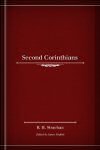
Second Corinthians
- Author: R.H. Strachan
- Editor: James Moffatt
- Series: Moffatt New Testament Commentary
- Publisher: Hodder & Stroughton
- Publication Date: 1935
- Pages: 149
In this volume R.H. Strachan provides commentary on Paul’s lengthy second letter to the church at Corinth. Continuing in the mission of Moffatt’s commentary series, Strachan provides practical commentary on Paul’s letter calling the Corinthians to unified support of church ministry.
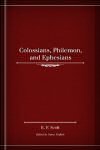
Colossians, Philemon, and Ephesians
- Author: E.F. Scott
- Editor: James Moffatt
- Series: Moffatt New Testament Commentary
- Publisher: Hodder & Stroughton
- Publication Date: 1948
- Pages: 257
E.F. Scott continues James Moffatt’s mission of putting practical, accessible Bible commentary in the hands of ordinary Christians in this commentary on Paul’s letters to the Colossians, Ephesians, and Philemon. Thorough introductions to each epistle are followed by commentary that explicate Scripture for the use of laypeople in the trenches of Christian living.
E.F. Scott (1868–1954) was professor of biblical theology and New Testament at Union Theological Seminary.
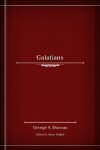
Galatians
- Author: George S. Duncan
- Editor: James Moffatt
- Series: Moffatt New Testament Commentary
- Publisher: Harper & Brothers
- Publication Date: 1934
- Pages: 199
In George S. Duncan’s commentary on Paul’s epistle to the Galatians, he continues the work of Moffatt’s series, bringing practical and accessible commentary to laypeople. Duncan provides a background of Galatians and helps bring Paul’s lessons of justification by faith in Christ to ordinary Christians.
George S. Duncan (1860–1946) was a pastor and professor of Semitic languages and Egyptology/Assyriology at Howard University, John Hopkins University, and American University. He was also dean of the YMCA School of Religion.
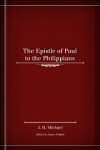
The Epistle of Paul to the Philippians
- Author: J.H. Michael
- Editor: James Moffatt
- Series: Moffatt New Testament Commentary
- Publisher: Harper & Row
- Publication Date: 1928
- Pages: 230
In this volume, J.H. Michael brings the “everyman’s” philosophy behind Moffatt’s commentary series to Paul’s letter of thankfulness and joy to the church at Philippi. Michael’s commentary is rich with practical insights on how to apply Paul’s lessons of contentment and rejoicing to the lives of ordinary Christians.
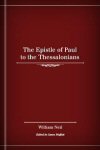
The Epistle of Paul to the Thessalonians
- Author: William Neil
- Editor: James Moffatt
- Series: Moffatt New Testament Commentary
- Publisher: Hodder & Staughton
- Publication Date: 1950
- Pages: 204
In this volume, William Neil explicates Paul’s letters to the church at Thessalonica. Paul focuses on the significance of faith and correct doctrine for daily Christian living, and Neil unpacks the apostle’s words using James Moffatt’s New Translation of the Bible.
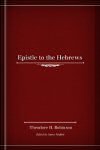
Epistle to the Hebrews
- Author: Theodore H. Robinson
- Editor: James Moffatt
- Series: Moffatt New Testament Commentary
- Publisher: Hodder and Stoughton
- Publication Date: 1933
- Pages: 206
This volume contains Theodore H. Robinson’s “everyman’s” commentary on Hebrews. While based on the original Greek, Robinson offers a running comment on the text in clear, and straight-forward English.
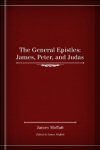
In this volume of James Moffatt’s New Testament commentary series, Moffatt himself steps in to explicate the general letters—James, 1 and 2 Peter, and Jude. Throughout he follows his passion to see the Scripture’s explicated for the use of laypeople in the trenches of Christian life, offering practical insights backed with a strong scholarly background.
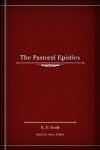
The Pastoral Epistles
- Author: E.F. Scott
- Editor: James Moffatt
- Series: Moffatt New Testament Commentary
- Publisher: Hodder and Stoughton
- Publication Date: 1936
- Pages: 183
E.F. Scott’s commentary on the pastoral epistles follows Moffatt’s desire to bring Scripture to ordinary homes. Scott explicates Paul’s letters to Timothy and Titus for the benefit of laypeople, bringing the Word to the trenches.
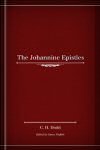
C.H. Dodd’s commentary on John’s three epistles places emphasis on the relationship between the epistles and John’s Gospel, and how the epistles can inform our study of the fourth Gospel.
C.H. Dodd (1884–1973) was a Welsh New Testament scholar and influential Protestant theologian. He was Norris-Hulse Professor of Divinity at the University of Cambridge. He is best known for his theory of “realized eschatology”—believing the kingdom of God referenced by Jesus was a present reality.
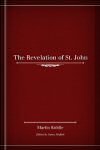
When James Moffatt invited Martin Kiddle—a busy vicar of a large parish—to write a commentary on Revelation, he told him, “My idea was and is to have [the commentary series] written by scholars who were in close touch with the actual life of Christian people, not from an outlook through college windows.” True to this aim, Kiddle’s commentary brings insightful, practical insight to the ordinary reader of Revelation. His introduction includes an exposition of the modern approach to revelation and contextual information, as well as a rhetorical examination of Revelation.
Martin Kiddle was vicar of Christ Church, Harogate and lecturer of Leeds Parish Church.
About James Moffatt
James Moffatt (1870–1944) was educated at Glasgow University and went on to become a professor of Greek and New Testament exegesis at Oxford in 1911. A short while later, Moffatt accepted the position of professor of church history at the United Free Church College. Moffatt’s utmost ambition was to provide an easily readable Bible. His contributions included paraphrased translations for coherent understanding.
Reviews
2 ratings
Florin Hiltz
3/11/2025
NICE TRY! It's NOT ALL THERE, SO IT IS NOT NEW TESTAMENT, REALLY! COME LOGOS!
Faithlife User
2/8/2018
Mike Massey
2/5/2017
Its misleading to offer a "set" and leave out a volume. Especially a set that is almost 70 years old..;.John Featherstone
1/22/2016
I seem to be missing some books. I haven't been able to find the advertised "General Epistles" in my set. and a count of the volumes only adds up to 11.... Was this a partial release? Can I expect more, the other 5 volumes, later? I'm more than a little disappointed..Dr Jason Harris
7/3/2015
What? This was advertised as "Moffatt New Testament Commentary Series" but then it's missing one of the New Testament letters? o.0 That's odd... at least... Can someone please explain this?

Ian Carmichael
1/18/2014
Come on, folks! Include Moffatt on 1 Corinthians in this group! It's the only volume missing from the set - and it's in your kitbag of availability. (And, btw, your headline advertises 16 volumes - the small print itemises 15. So there's room to fit the volume in and only edit the small print!) The rest is of interest, but with the inclusion of 1 Cor it would be a must have for me.